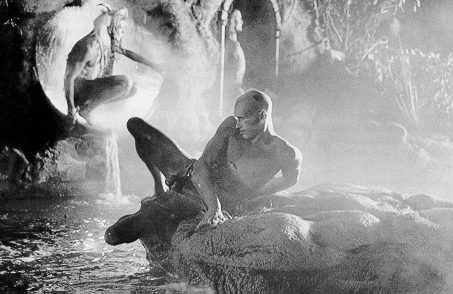Ariel, a spirit native to the island, is associated with the element
of air. Before Prospero arrived, Sycorax tried to constrain Ariel through
her magic, but he refused to carry out her "earthy and abhorr'd commands."
So Sycorax imprisoned him in a pine tree. She did not have powerful enough
magic to free him and then she died. Only with Prospero's arrival and his
powerful magic is Ariel freed from the pine tree, but on the condition
that he serve Prospero for 12 years. That time is almost up as The Tempest
begins. Most of the actions of the play are staged in some way by Ariel
and his fellow spirits, under the direction and orders of Prospero. He
creates the storm which appears to wreck the boat, but saves the ship and
all the crew. Ferdinand lands separately, and Ariel uses music to lure
him to Prospero's cell, where he meets and falls in love with Miranda.
Ariel gives Antonio and Sebastian an opportunity to plan Alonso's murder
by putting the king and his other courtiers to sleep; he later wakes them
in time to foil the murder plans. He warns Prospero of the plot against
him by Caliban with the help of Stephano and Trinculo, and he helps foil
that plot, too. He and his fellow spirits put on the harpy masque in which
they confront Alonso, Sebastian and Antonio with their overthrow of Prospero
as well as the marriage masque for Ferdinand and Miranda. When Prospero
has all his enemies in his power, Ariel talks about pitying them--IF he
were human, and this seems to decide Prospero to forgive them. At the end,
he is told to provide good weather for the ship's trip back to Italy, and
then Ariel is given his freedom.
Ariel has been shown in a number of ways--(top) as an exploited
colonial subject (with dreadlocks) in Ron Daniels' 1982 production at the
Royal Shakespeare Theatre; (middle) as a strongly sexual being in Peter
Greenaway's film adaptation, Prospero's Books; (bottom) as a female
spirit as in Margaret Leighton's Ariel serving Ralph Richardson as Prospero
in the 1952 production of the Royal Shakespeare Company.
 Photostage/Donald
Cooper
Photostage/Donald
Cooper
 Marc Guillaumot
Marc Guillaumot Angus McBean, Harvard Theater Collection
Angus McBean, Harvard Theater Collection